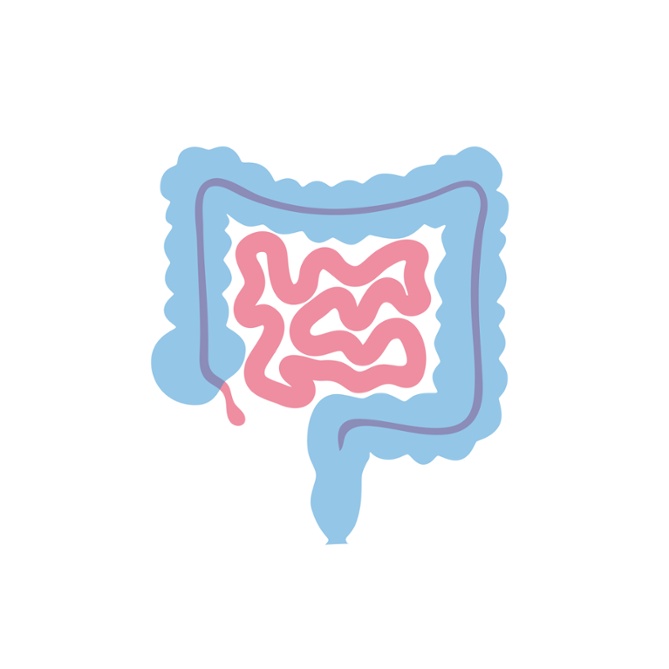Omega-3 fatty acids like EPA, DHA, and DPA from fish oil are well-known for their anti-inflammatory effects on the body.
The anti-inflammatory benefits also help reduce inflammation in the gut and work to promote and maintain a healthy gut microbiome.
Omega-3 Fats and Gut Inflammation
A gut cannot be healing and inflamed at the same time. While it can be beneficial to remove triggering foods and increase probiotic and prebiotic intake – there are a number of ways to support inflammation in the body.
While inflammation may seem like a short-term discomfort to most, it can be a serious concern if it is left to linger over a long time period.
Inflammation is a central component of chronic disease and can trigger life-threatening health issues. For instance, chronic inflammation in the gut can increase the risk of colorectal cancers (1).
While we commonly use curcumin, immunoglobulins, ginger & licorice root to support inflammation in the stomach and gut, omega-3 fatty acids can also be useful to decrease whole-body inflammation, and, targeted anti-inflammatory effects on the gut that have been previously under-appreciated.
Role of Omega-3 Fats for the Gut:

- Reduce inflammation associated with leaky gut, intestinal inflammation and more – without disturbing the normal immune response (2)
- Potential for pain and inflammation support without suppression of the immune system, nor an immediate need to turn to addictive opioids (3)
- A mucosal lining cannot be inflamed and healing at the same time. Fully resolving an inflammatory cascade supports the body’s ability to build and maintain a healthy mucosal lining.
- The gut has its own enteric nervous system (ENS); the ENS is subject to the same neuro-degeneration recognized elsewhere in the body. Omega-3 fats support healthy nerve structure and signaling (4; 5; 6
- Support normal levels of C-Reactive Protein (CRP) – a benchmark of general inflammation levels in the body (7)
- Omega-3 intake helps stimulate the intestines to produce and secrete intestinal alkaline phosphatase (IAP).
- IAP promotes healthy changes in the flora composition of the gut, decreases the production of endotoxins, promotes and preserves tight junction health even when the gut is inflamed, and has been considered crucial for the barrier function of the gut (8; 9).This promotes a healthy microbiome while also reducing metabolic endotoxemia and inflammation (10)
DHA Benefits for the Gut:
–DHA has also been shown to promote local protection in the intestinal mucosa (11).
DPA Benefits for the Gut:
–DPA leads to the production of the protectins and resolvins able to specifically target inflammation in the intestine, while also reducing systemic inflammation (12; 13).
EPA Benefits for the Gut:
A fish oil with a high ratio of EPA can be better targeted to support overall gut health.
-Researchers looked at supplementing 2g of EPA with ulcerative colitis patients for 90 days. The results were published in the prestigious journal Nature.
-The findings demonstrated that EPA supplementation reduced mucosal inflammation, promoted goblet cell differentiation (goblet cells produce mucin barrier layer), and improved the balance of gut bacteria in chronic ulcerative colitis patients (14).
The mucin mucus layer is an important communication structure between the gut flora and immune cells. The gut flora plays important roles in training appropriate immune responses against unwanted invaders.
-For inflammatory bowel conditions, the same Nature study demonstrated that EPA has a localized anti-inflammatory effect on the gut – and supports keystone strains of gut flora – improving overall microbiome diversity.
Omega-3 Fats and Gut Health:
Omega-3 fats such as EPA, DHA, and DPA found in fish oil provide anti-inflammatory benefits.
- Foremost, they counterbalance the inflammatory effect of omega-6 fats which are highly prevalent in Western diets.
- Second, they provide gut-specific benefits to reduce inflammation, reorganize the immune system without suppressing it, promote a healthy gut barrier, and support and maintain a healthy balance of gut bacteria.EPA, DHA, and DPA promote these benefits by:
- counterbalancing the inflammatory nature of omega-6 fatty acids
- Converting to pro-resolving mediators (PRMs/SPMs), which help to “resolve” inflammation, clear out pathogens, and heal gut and body tissues. Unresolved inflammation can otherwise become chronic.
Intake of omega-3 fatty acids promotes the release of intestinal alkaline phosphatase, which regulates the microbial environment of the gut – promoting healthy bacteria and discouraging unwanted flora.
Omega-3 Supplementation for Gut and Microbiome Health:

We use MegaOmega by Microbiome Labs to support omega-3 levels.
Unlike most fish oils, it contains EPA, DHA, and DPA – the “forgotten” omega-3 in a high-EPA ratio intended to support the gut.
MegaOmega’s DPA levels are up to 250% higher than competing formulas – providing a more complete source of synergistic omega 3 fats.
Additionally, pro-resolving mediators (PRMs/SPMs) were added to this formula to help jumpstart inflammation support. Levels of these compounds otherwise depend on a delayed conversion from EPA, DHA, and DPA.
Other products contain EPA, DHA, and DPA. Cod liver oil supplements can contain DPA, and also contain natural levels of immune and mucosal supporting nutrients Vitamin A and Vitamin D.
An honorable mention to evening primrose oil – an important omega-6 fatty acid that helps to maintain balance with omega 3’s. It’s available on its own and there is a well-regarded medical food for ADHD support known ass Equazen Pro that contains a clinically studied ratio of omega 6 and omega 3 fats.
These products may not contain the supplementary pro-resolving mediators, nor may they include a ratio of EPA, DHA, and DPA ratio intended specifically for the gut.
For those looking to supplement with high-dose Pro-Resolving Mediators separately – consider SPM Active by Metagenics.
Metagenics was one of the first companies to concentrate PRMs/SPMs into a nutraceutical product.
Note: While pre/pro-resolving mediators (PRMs), and specialized pro-resolving mediators (SPMs) are distinct, many companies use these terms interchangeably as PRMs convert to SPMs in the body.
Omega 3 fatty acids serve as natural precursors to these unique anti-inflammatory compound while also naturally supporting gut, brain, and whole-body health.
Related Articles:




